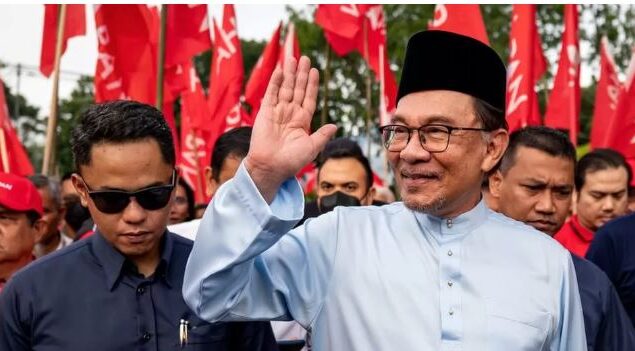Police in India claim that 200 kg of seized cannabis was eaten by rats
Nearly 200kg (440lb) of cannabis was seized from dealers and placed in...

After several attempts over many years and days of uncertainty, Anwar Ibrahim has been given the position.
After the weekend’s elections produced an unprecedented hung parliament, King Sultan Abdullah appointed the next leader.
The simple majority required to establish a government had not been gained by either Mr. Anwar or former premier Muhyiddin Yassin.
It is unclear at this time with whom Mr. Anwar would form a coalition.
According to a statement issued by the palace earlier on Thursday, “His Majesty has given authorization to nominate Anwar Ibrahim as the 10th Prime Minister of Malaysia after taking into consideration the views of Their Royal Highnesses the Malay Rulers.”
In the late afternoon, the king swore in the new PM.
Despite having the largest percentage of seats gained in the election on Saturday, Mr. Anwar’s Pakatan Harapan (PH) party is unable to form a government on its own.
It took five days of difficult discussions to agree on a new administration; during that time, different party alliances and coalitions were proposed and ultimately rejected.
Finding a viable majority was challenging because of the personal and ideological conflicts among many of the political leaders.
In the end, King Abdullah of Malaysia, who is also a constitutional monarch, was left to call all the leaders to the palace and attempt to reach a satisfactory understanding.
Whether the new administration will be a formal coalition of parties, a minority administration with other parties giving a confidence and supply arrangement, or a national unity administration with representation from all major parties is unclear.
Anwar Ibrahim, a gifted orator and, 25 years ago, a quickly rising star whom everyone anticipated would succeed then-prime minister Mahathir Mohammad, ends his incredible political odyssey with the choice.
But that was not to be. He and Mr. Mahathir had a falling out over how the Asian financial crisis was handled, and he was imprisoned on what were viewed as politically motivated corruption and sodomy allegations.
After his conviction was reversed in 2004, he went back into politics and nearly defeated the UMNO party in the 2013 election. However, new sodomy accusations were then brought against him, and he was subsequently sent back to prison in 2015.
However, as opposition to the then-prime minister Najib Razak increased due to the massive 1MDB scandal, Mr. Mahathir emerged from retirement, made amends with Mr. Anwar, and together they helped the ruling party suffer its first-ever defeat in 2018, which resulted to Mr. Anwar’s pardon by the king.
However, the agreement they made—that Mr. Mahathir, who was already in his 90s, would transfer the PM’s office to Mr. Anwar—failed in 2020, and the top position slipped through his hands once more.
Now that he has accomplished his objective, he must cooperate with some of his fiercest political adversaries while facing extremely difficult circumstances, including an economy that has been severely damaged by Covid.
Non-Malays in Malaysia will feel a little relieved that Mr. Anwar’s reformist Pakatan Harapan would be leading the country’s new administration.
The hardline Islamist party PAS, which non-Malaysians believed would push for a more repressive and intolerant form of governance, dominates the rival Perikatan Nasional.
Given all the other difficulties the new government will encounter, Mr. Anwar’s objective of creating a more pluralist and inclusive Malaysia won’t be easy to achieve.
Catch all the International News, Breaking News Event and Latest News Updates on The BOL News
Download The BOL News App to get the Daily News Update & Follow us on Google News.